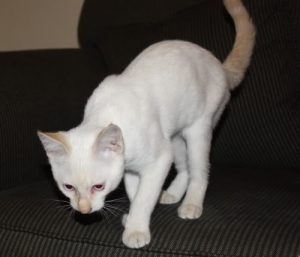Hepatic Encephalopathy – Pet Owner Experience
Ron Hines DVM PhD
*************************
owner updates in green my comments in purple
November 30, 2020
My fiance and I have a 12-week-old Golden retriever named Goose. When he was 9 weeks old, his vet gave him medications for parasites, a heartworm medication, and something for ticks & fleas. He became extremely thirsty and urinated frequently later in the day. Our vet started him on Clavamox antibiotic. Two days later Goose looked uncomfortable, hid and walk around with his tail between his legs. Then he developed a head bob that caused him to sway his head left and right. We brought him to the emergency clinic. They gave him fluids and thought he might have a liver shunt. Currently he is on Hills L/d diet™, metronidazole and lactulose. Goose now has his old energy and personality back. Goose’s liver enzymes were normal but they went ahead and checked his bile acid level. Goose was 200 umol/L fasted and 207 umol/L 2 hours after eating. We wonder if he was over medicated and had too many toxins in his body all at once. We have a CT scheduled in 2 weeks. The breeder believes everything was caused from the NexGard flea/tick medicine. Goose was definitely the runt of his litter. we are working with O.V.H. for the CT scan and plan on surgery if it is a safe option. We are aware of the AMC in NYC. If it turns out to be an internal shunt of the liver, the only doctor that could operate on an internal one in our area would be Chick Weisse at the AMC. But he doesn’t do operations until puppies are at least 8 months of age. My fiance and I are worried about the long term bile acid effects as well as him being on medications.
Nick, Bergen County, New Jersey
*************************
October 4, 2017
Hi Dr. Hines,
your article on hepatic encephalitic and I saw at the bottom that you had more information but did not post it online. My dog Pixie was recently diagnosed with HE – about two months ago. She is a three year old chihuahua mix, I adopted her at about six months old along with her mother. She didn’t have many symptoms when I took her to the vet. She was coughing a little bit, mostly at night, a dry cough turned to a wet cough. On the third morning she didn’t seem right or look right. I went to work and my mom said she would take her. She ended up having a seizure and my mom took her to the vet right away. The vet treated her and said she had Lyme disease and gave her doxycycline. I came home from work and she had another seizure so I took her to the emergency clinic and she was stabilized and given anti-seizure medication and kept overnight. In total she had 5 seizures. At this point the specialty vet thought it was neurological. An MRI and spinal tap were offered but since it was so expensive I decided to hold off on it and give her a chance. She also had a high fever at the time; but the next day the fever was down when I picked her up. She had a very slow recovery and is still not 100% herself. She couldn’t run and every improvement was great to see. About two weeks ago, I took her back to the regular vet to see why she isn’t recovering since at the time her official diagnosis was Lyme disease and she finished her doxycycline treatment. She was also on prednisone (2 weeks) and phenobarbital for a few days for the seizures. The next time I took her back, the vet thought it was neospora and she was treated with a different antibiotic for possible brain swelling. She was taken back to the vet again because her [liver] blood results were high and she needed to have a bile acid test. She was fasted, blood was drawn, then given food and blood was drawn again. The bile acid levels were high. Right now, I have another appointment with the specialty surgery vet but I really do not want her to have surgery. She still needs to have a sonogram. I’m really interested in more of a dietary approach. She has been taken off of protein last week and given a prescription diet low-protein dog food (Hill’s Liver Formula). I plan on trying the milk thistle and supplements that you suggested. Can you please send me the information that you mentioned in your article and any other helpful information? I would really appreciate it!
10/26/17 I wanted to give you an update on Pixie’s consultation at PVSEC in their surgery department. We met with two surgeons and both of them agreed that surgery may do more harm than good because of her history of seizures from when she first became ill. They are worried she will have cluster seizures after waking up from anesthesia. A veterinary radiologist performed the doppler ultrasound, but did not find a shunt at all. But they are not completely ruling out an internal shunt. The only way they would know is to look inside her liver but they do not want to do that and neither do we. They are not completely sure if it is HE since they could not find a shunt. They also mentioned Microvascular Dysplasia. Her bile acid test was high – 78 fasted and then 120 after food – but they have seen dogs in the 300s. So it was not a clear diagnosis and they want to continue medical management. Pixie has greatly improved since we added the milk thistle, she is able to jump on and off the couch and do a few stairs. She is also running in the yard now. We’re happy with her improvement, she is about 95% better. She is kept on a strict low-protein prescription diet and vegetables, cottage cheese/probiotic yogurt, milk thistle, lactulose and antibiotic. She seems to enjoy her food. The specialist vet said to keep doing what we are doing and I’m happy with that result too. He also agreed to add the SAMs that was suggested in your article. I’m not sure when to add any additional supplements. She is doing well with the milk thistle now. The day after her appointment she did take a little step backward, her movement was not as steady and she started scratching her temples more often, I’m sure she was stressed and it was a long appointment, from 9 -2. We had to leave her while she was taken for the ultrasound and there were a few animals in front of her. She was also fasted and not on her food schedule until we got home other than a little bit of her dry food. The next day she was more herself and on her food schedule. Maria
You are on the Vetspace animal health website
Visiting the products that you see displayed on this website help pay the cost of keeping these articles on the Internet.






